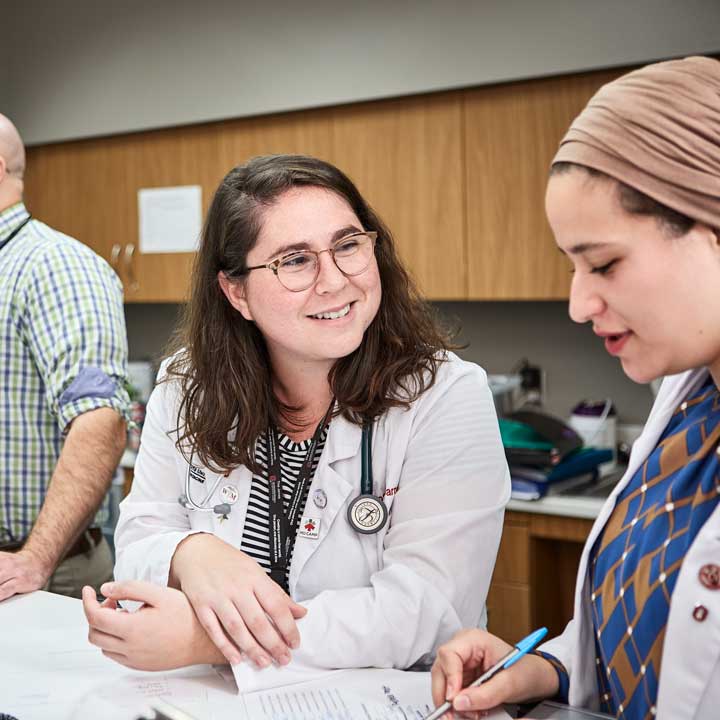
Alcohol-related aggression: New therapies may result from Ohio State study
 In 2017, two separate issues were creating treatment barriers for people with substance use disorders. These barriers were getting worse in communities like Columbus, and causing problems for both patients and doctors. Julie Teater, MD, clinical associate professor in the Department of Psychiatry and Behavioral Health at The Ohio State University College of Medicine, and Julie Niedermier, MD, clinical professor in the Department of Psychiatry and Behavioral Health, were on the front lines of this “perfect storm.”
In 2017, two separate issues were creating treatment barriers for people with substance use disorders. These barriers were getting worse in communities like Columbus, and causing problems for both patients and doctors. Julie Teater, MD, clinical associate professor in the Department of Psychiatry and Behavioral Health at The Ohio State University College of Medicine, and Julie Niedermier, MD, clinical professor in the Department of Psychiatry and Behavioral Health, were on the front lines of this “perfect storm.”
The first concern was the growing opioid overdose epidemic. According to the National Institute on Drug Abuse, overdose deaths from opioids increased from 21,088 in 2010 to 47,600 in 2017 and to 46,802 in 2018. Then, overdose deaths spiked in 2020 to 68,630. Ohio was immersed in the epidemic, as fentanyl and other illegal drugs increased the state’s unintentional overdose death rate to more than 4,100 people in 2017. It was clear that more addiction services were needed immediately. However, a second issue was also a problem: not enough addiction medicine programs.
Traditionally, addiction medicine was not a focus of most medical education programs. “At most medical schools, it was never offered as an option. It was often an afterthought,” Dr. Teater says.
As a result, there was — and still is — a severe shortage of qualified doctors trained to treat this growing patient population. In 2017, the American Board of Medical Specialties recognized addiction medicine as a medical specialty for doctors. Then, the Accreditation Council for Graduate Medical Education also recognized it as an approved specialty.
Dr. Teater and Dr. Niedermier saw the devastating impact daily in their clinical roles at The Ohio State University Wexner Medical Center and knew there weren’t enough providers available. They also understood that more research was needed to understand the problem and how to address it.
“We were definitely ahead of the curve,” Dr. Niedermier says. “The minute we were given the go-ahead to add addiction medicine training to our curriculum, we jumped at the chance.”
Ohio State became the 51st addiction medicine fellowship created in the nation. Since then, 41 more programs have been created. And more are needed.
Dr. Teater and Dr. Niedermier share a goal to implement addiction medicine training programs at every level at The Ohio State University.
“We want to inspire students to think about adopting addiction medicine as a specialty,” says Dr. Teater. “To do that, we must expose them early in their education. Their first exposure is a semester of research at the beginning of the undergraduate and graduate programs. We just started the program this semester, and we are excited to see how the students take to the work,” Dr. Teater says.
Dr. Niedermier also received a grant from the Substance Abuse and Mental Health Services Administration to offer medical students X-Waiver training. This training prepares them to prescribe buprenorphine, often called suboxone. The grant has now ended, but the school will continue offering the training. “Students have told me they are extremely grateful that we offer it,” Dr. Teater says.
Fourth-year medical students also participate in a statewide curriculum that Dr. Teater and Dr. Niedermier helped develop with the Ohio Attorney General’s Office. This online course offers a 360-degree view of addiction and recovery, including modules on the neurobiology and treatment of addiction, the stigma of addiction and social determinants of health. During the course, students work together to “solve” a patient case, including diagnosis, treatment, prescriptions and follow-up. Medical students work with nursing and pharmacy students who also take the course.
Addiction medicine training is also available to residents and fellows. All psychiatry residents are trained in clinical addiction care in their second year. In the third year, they complete a yearlong addiction medicine outpatient clinic.
Dr. Niedermier was awarded a federal grant to expand the addiction medicine fellowship program from two to four spots per year. Ohio State has graduated six addiction medicine fellows so far. Four fellows are currently enrolled this academic year and four are committed for the next academic year. Four fellows plan to stay at the Ohio State Wexner Medical Center to practice.
“The goal is to entice as many students, residents and fellows as possible to not only choose addiction medicine as a specialty but to stay in Ohio to practice,” Dr. Teater says.
The addiction fellowship program has also gained a national reputation for research. Former fellow Trent Hall, DO, is now a clinical assistant professor in the Department of Psychiatry and Behavioral Health and has worked with 11 undergraduate students, fellows and other medical students on several important research projects, just in the last year.
“Research is critical to the future of addiction medicine, and Dr. Hall is at the forefront of it,” Dr. Teater says.
Dr. Teater emphasized that addiction medicine needs a multidisciplinary approach. She thinks there should be addiction medicine training, clinical rotations and field training placements for emergency and internal medicine residents, nurse practitioners and social work students.
“Back in 2017, we were lucky that Ohio State recognized and understood the implications of the coming storm. Our leaders supported our initiatives to add more training opportunities and offered resources within the school and the hospital whenever they could,” Dr. Teater says. “Our clinical and educational missions are closely tied. The clinics are critical incubators for learning, and it is important to expand training into other departments at the university and the medical side of the hospitals.”
There are more plans to expand Ohio State’s addiction medicine treatment and training programs. Dr. Niedermier reports that the hospital will open a residential unit in 2023.
“This unit has been several years in the making,” she says. “We wouldn’t have been able to do it without training new people and having a fellowship dedicated to addiction medicine.”
Dr. Teater says, “Each student who graduates with addiction medicine training can treat hundreds, if not thousands, of people in a single year. Imagine how many people they’ll help in their career. The need for these specialists has just amplified in the last five years, and we are doing everything we can to answer the call.”